|
|
|
Sort Order |
|
|
|
Items / Page
|
|
|
|
|
|
|
| Srl | Item |
| 1 |
ID:
113019
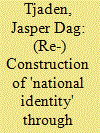

|
|
|
|
|
| Publication |
2012.
|
| Summary/Abstract |
Social constructivist theories regard the nation as 'imagined' (Anderson), 'invented' (Hobsbawm and Ranger), and 'narrated' (Bhabha). National narratives use mass rituals, performances, and selective national history to reinvigorate collective identity. This article examines the 1910 centennial festivities in Chile as a collective and discursive quest for national identity in a changing society longing for stability. The article uses a discourse analysis approach to study a series of Chilean national history abstracts and coverage of the centennial festivities as presented in Zig-Zag, the most relevant political magazine at the time. The study finds that selective memory and mass ritual discourse are a constitutive part of national identity. Through the process of selective memory, the sources depict Chilean history as a series of linear, coherent, and meaningful events to foster collective identification with the nation. The images of mass ritual discourse of the centennial celebrations reinforce common national characteristics and confidence in the nation. Mass performances provide emotional self-affirmation and an endowment of meaning for individuals within their national group as they restage current national membership with reference to a common past. The study identifies themes of national representation along which the nation is narrated, and suggests that this typology can be generalised beyond the case of Chile. In doing so, this article underscores the need for further research on the concept of discursive national identity formation and its relevance in contemporary politics.
|
|
|
|
|
|
|
|
|
|
|
|
|
|
|
|
| 2 |
ID:
121197
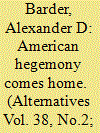

|
|
|
|
|
| Publication |
2013.
|
| Summary/Abstract |
International theorists have long argued over the longevity of American hegemony and whether or not the American-centered international order is currently in crisis. What remains largely missing in many of the analyses of the history and present of American hegemony is an examination of how maintaining global hegemony affects or has affected domestic American political and economic institutions. Looking back at the early 1970s, I examine the nexus between the crisis of American global hegemony in the aftermath of the Vietnam War, the project of neoliberalization in Chile and how the Chilean socioeconomic "laboratory" set an important precedent for the subsequent adoption of neoliberal reforms in the United States under the Reagan Administration. The reassertion of American hegemony was coextensive with a neoliberal project that was initially experimented with in Chile under the authoritarian rule of Augusto Pinochet.
|
|
|
|
|
|
|
|
|
|
|
|
|
|
|
|
| 3 |
ID:
183085
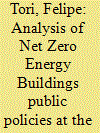

|
|
|
|
|
| Summary/Abstract |
The building sector could have a high impact on the reduction of GHG emissions. Several countries have developed public policies to encourage Net Zero Energy Buildings (NZEB) as one of the main approaches to reach their GHG reduction goals. Chile has adopted different goals and action plans to reduce fossil fuels and GHG emissions. However, there is a lack of public policies for the building sector. Chile should consider the NZEB an effective measure to reduce GHG emissions because this policy has been successful in other countries, regions, or states because NZEB reduce energy consumption in the building sector and produce energy from renewable sources. This research aims to identify, analyze and compare mandatory public policies of different countries towards NZEB. Different countries' public policies are identified and classified through a literature review based on keywords. Chilean public policies are compared concerning them worldwide. We concluded that Chile has not yet developed public policies to promote NZEB as part of the strategies to achieve its environmental commitments for the coming years. We suggested evaluating the technical potential of buildings to reach NZEB standards in different Chilean climates before elaborating future public policies towards NZEB. It is concluded that Chile has to develop regulatory, economic and information, motivation and advice policies towards NZEB that are the mainstream policies worldwide.
|
|
|
|
|
|
|
|
|
|
|
|
|
|
|
|
| 4 |
ID:
079585
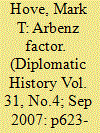

|
|
|
| 5 |
ID:
165050
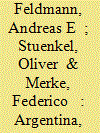

|
|
|
|
|
| Summary/Abstract |
This article examines the role of Argentina, Brazil and Chile (the ‘ABC countries’) in supporting democracy through the logic of consequences and appropriateness in three emblematic cases: the removal of President Zelaya in Honduras in 2009, the constitutional crisis that led to the removal of President Fernando Lugo in Paraguay 2012 and the sudden closing of the National Assembly in Venezuela in 2017. The authors argue that the ABC governments’ responses to governance crises have been shaped by a mixture of motivations, both instrumental (geopolitical interest or ideological affinity) and ideational (a normative preference for democracy). This mixture has resulted in inconsistent policies deriving from the mismatch between the normative commitments made by these countries, enshrined in multilateral instruments such as democracy clauses, which have often limited their room for manoeuvre, and their preference for a measured, prudent foreign policy based upon traditional principles of non-intervention. Specifically, the authors find that the ABC countries’ stance on democracy support depends on two fundamental conditions: their leverage vis-à-vis the target state and the degree of certainty regarding a potential resolution of a given democratic crisis.
|
|
|
|
|
|
|
|
|
|
|
|
|
|
|
|
| 6 |
ID:
150202
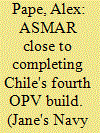

|
|
|
| 7 |
ID:
134209
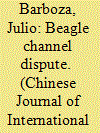

|
|
|
|
|
| Publication |
2014.
|
| Summary/Abstract |
The Beagle Channel dispute between Chile and Argentina presented great challenges to them. An award delivered by an arbitral tribunal did not manage to settle it. The crisis after the award brought the States to the brink of war. Only tenacious efforts by the Holy See to mediate between these two largely Catholic nations managed to calm tensions as well as a change in political climate allow the parties to finally settle the dispute. This paper describes and analyses the background to the dispute, the principles and arguments involved in the dispute, the decision of the Court of Arbitration, the crisis following the award, the papal mediation and the events that finally brought the dispute to an end. Some general comments will be offered in the last section.
|
|
|
|
|
|
|
|
|
|
|
|
|
|
|
|
| 8 |
ID:
105369
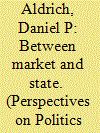

|
|
|
|
|
| Publication |
2011.
|
| Summary/Abstract |
Developed and developing nations alike face low-probability but high-consequence exogenous shocks, including ice storms, chemical spills, terrorist attacks, and regional blackouts. Recently, "natural" disasters have dominated the airwaves; mega-catastrophes that claim more than 1,000 lives have become an almost yearly occurrence. In 2010, the Haiti and Chile earthquakes killed more than 200,000 people between them and felt all too familiar to many observers in the West. Before them were Cyclone Nargis in Burma, which took 130,000 lives in 2008; Hurricane Katrina, which killed more than 1,500 New Orleans residents and left 80% of the city flooded in 2005; and the Indian Ocean tsunami, which claimed roughly a quarter of a million lives in India, Indonesia, Sri Lanka, and Thailand in 2004.
|
|
|
|
|
|
|
|
|
|
|
|
|
|
|
|
| 9 |
ID:
105566
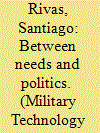

|
|
|
| 10 |
ID:
123481
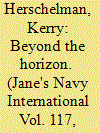

|
|
|
| 11 |
ID:
105573
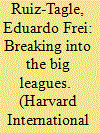

|
|
|
| 12 |
ID:
124758
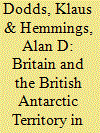

|
|
|
|
|
| Publication |
2013.
|
| Summary/Abstract |
Britain's contemporary and future relationship with the British Antarctic Territory and the wider region is the subject matter of this article. In the aftermath of the ill-fated plans for a merger of British Antarctic Survey (BAS) and the National Oceanography Centre, it is timely to ask how the UK projects influence and secures its scientific, resource and strategic interests. The contemporary Antarctic is increasingly characterized by tension over resource management and conservation politics as Antarctic Treaty parties disagree, both in private and public, over the purpose of legal instruments and the regulation of activities such as fishing and marine conservation. While we do not predict the collapse of the Antarctic Treaty System (ATS), our analysis suggests that the effectiveness and legitimacy of the ATS is increasingly under challenge. The United Kingdom's position as a claimant state and original signatory to the Antarctic Treaty is complicated by the presence of counter-claimants (Argentina and Chile) and a wider preoccupation with other overseas territories, such as South Georgia and South Sandwich Islands and the Falkland Islands. Polar science, carried out by BAS and other British agents, remains critical not only for maintaining the UK's 'soft power' but also increasingly for cementing a 'strategic presence' in the Antarctic. The article ends with a cautionary note: scientific excellence is no longer sufficient to guarantee geopolitical/strategic interests and there is growing evidence that claimant and non-claimant states alike are no longer regarding Antarctica as an area that will remain free of intensifying and diversifying resource exploitation.
|
|
|
|
|
|
|
|
|
|
|
|
|
|
|
|
| 13 |
ID:
188801
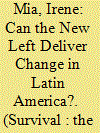

|
|
|
|
|
| Summary/Abstract |
The intense Latin American electoral cycle of 2020–22 coincided with deteriorating socio-economic conditions in the wake of the COVID-19 pandemic and increasing frustration with the status quo. Anti-incumbent sentiment coupled with demands for more inclusive and fair economic models prompted a pronounced shift to the left in the region, although with many different shades of ‘pink’. But an increasingly polarised and fragmented political and social environment is testing the ability of new governments to deliver change, as shown by the popular rejection of a new constitution in Chile. A more limited fiscal space is also constraining these governments’ effectiveness. Nevertheless, political alignment among countries with important stakes in global climate-change mitigation and thwarting drug trafficking could produce more cohesive foreign-policy stances and increased regional leverage.
|
|
|
|
|
|
|
|
|
|
|
|
|
|
|
|
| 14 |
ID:
068969
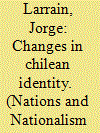

|
|
|
| 15 |
ID:
129202
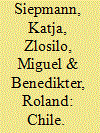

|
|
|
|
|
| Publication |
2014.
|
| Summary/Abstract |
The Chilean Presidential and Parliamentary elections of the first-round general election on November 17th and the second round run-off for the presidency between remaining candidates Michelle Bachelet and Evelyn Matthei on December 15th, 2013 were decided by problems, not by ideology, and by past rather than future issues. These issues, partly hidden from the international public, are likely to remain over the next years. Thus comprehending them is crucial to understand the transition of the country.
|
|
|
|
|
|
|
|
|
|
|
|
|
|
|
|
| 16 |
ID:
086493
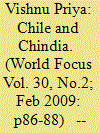

|
|
|
|
|
| Publication |
2009.
|
| Summary/Abstract |
Scholarly analyses explain the economic growth of Latin American-Caribbean (LAC) region over the past 7-8 years largely in terms of the rising consumption of regional exports by the world's two fastest growing economies namely, China and India. In particular, resource export economies of LAC region have benefited rather well from Asia's economic dynamism; others, with capability to export light manufactures and value-added products have not fared bad either.
|
|
|
|
|
|
|
|
|
|
|
|
|
|
|
|
| 17 |
ID:
128851
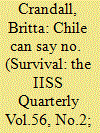

|
|
|
|
|
| Publication |
2014.
|
| Summary/Abstract |
Two recent books tell the story of the transition to Chile's now-vibrant democracy. Their complementary perspectives provide context for the choices Chileans made in last year's presidential elections. In an eerie confluence of fates, the two top contenders for Chile's presidency in late 2013, Michelle Bachelet and Evelyn Matthei, were actually childhood playmates. Their fathers, both air-force generals, had been friends and neighbours, but had contrasting political leanings and found themselves on opposite sides of the dictatorship that seized power in 1973. Mr Bachelet had become a high-ranking official in Salvador Allende's socialist administration, and was effectively tortured to death after the 1973 military coup that installed Augusto Pinochet as president. Mr Matthei, in contrast, was a rising star within the Pinochet regime, becoming head of the air force and ultimately working in the building in whose basement Mr Bachelet was detained and tortured. Thus, Michelle Bachelet and Evelyn Matthei represented not only two different futures, but two opposing pasts. While Bachelet promised free universal education and political reform, Matthei vowed to continue the policies of Chile's outgoing conservative president. The symbolism was anything but subtle.
|
|
|
|
|
|
|
|
|
|
|
|
|
|
|
|
| 18 |
ID:
150253
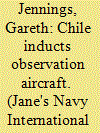

|
|
|
| 19 |
ID:
125574
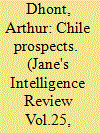

|
|
|
|
|
| Publication |
2013.
|
| Summary/Abstract |
Chilean voters head to the polls for a general election in November. Arthur Dhont discusses the potential for an energy crisis in the country as a result of ongoing protests, and looks at the impact the election results could have on future policy.
|
|
|
|
|
|
|
|
|
|
|
|
|
|
|
|
| 20 |
ID:
149401


|
|
|
|
|
|
|
|